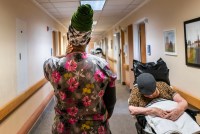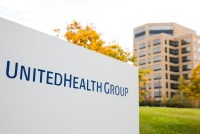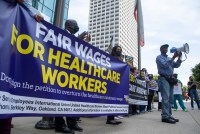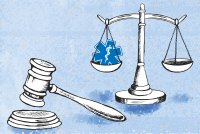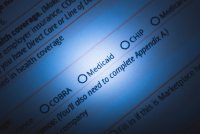Latest Morning Briefing Stories
Unsheltered People Are Losing Medicaid in Redetermination Mix-Ups
Some of the nearly 130,000 Montanans who have lost Medicaid coverage as the state reevaluates eligibility are homeless. That’s in part because Montana kicked more than 80,000 people off the program for technical reasons rather than income ineligibility. For unhoused people who were disenrolled, getting back on Medicaid can be extraordinarily difficult.
California Legislators Debate Froot Loops and Free Condoms
California state lawmakers this year are continuing their progressive tilt on health policy, debating bills banning an ingredient in Froot Loops and offering free condoms for high schoolers.
Biden Administration Sets Higher Staffing Mandates. Most Nursing Homes Don’t Meet Them.
The staffing regulation was disparaged by the industry as unattainable. Patient advocates say it doesn’t go far enough. Labor unions welcomed the requirement.
Rural Jails Turn to Community Health Workers To Help the Newly Released Succeed
To reduce recidivism, some rural counties are hiring community health workers or peer support specialists to connect people leaving custody to mental health resources, substance use treatment, medical services, and jobs.
Medical Providers Still Grappling With UnitedHealth Cyberattack: ‘More Devastating Than Covid’
Medical providers say they’re still coping with the Change Healthcare cyberattack disclosed in February even though parent company UnitedHealth Group reported that much is back to normal and its revenue is up over last year.
He Thinks His Wife Died in an Understaffed Hospital. Now He’s Trying to Change the Industry.
Nurses are telling lawmakers that there are not enough of them working in hospitals and that it risks patients’ lives. California and Oregon legally limit the number of patients under a nurse’s care. Other states trying to do the same were blocked by the hospital industry. Now patients’ relatives are joining the fight.
In San Francisco’s Chinatown, a CEO Works With the Community To Bolster Hospital
Jian Zhang, an immigrant from China with a doctorate in nursing, leads the 88-bed Chinese Hospital in San Francisco. The facility faces financial constraints like other independent hospitals, but its strong community support and partnerships have helped it weather tough times.
Newsom Offers a Compromise to Protect Indoor Workers from Heat
After rejecting proposed rules to protect millions of workers in sweltering warehouses, steamy kitchens, and other hot workplaces, California Gov. Gavin Newsom’s administration has offered a compromise to allow the protections to take effect this summer. But state and local correctional workers — and prisoners — would have to wait even longer.
What the Health? From KFF Health News: Too Big To Fail? Now It’s ‘Too Big To Hack’
Congress this week had the chance to formally air grievances over the cascading consequences of the Change Healthcare cyberattack, and lawmakers from both major parties agreed on one culprit: consolidation in health care. Plus, about a year after states began stripping people from their Medicaid rolls, a new survey shows nearly a quarter of adults who were disenrolled are now uninsured. Jessie Hellmann of CQ Roll Call, Sarah Karlin-Smith of the Pink Sheet, and Lauren Weber of The Washington Post join KFF Health News’ Mary Agnes Carey to discuss these stories and more. Also this week, KFF Health News’ Julie Rovner interviews Caroline Pearson of the Peterson Health Technology Institute.
Medicare’s Push To Improve Chronic Care Attracts Businesses, but Not Many Doctors
Most Medicare enrollees have two or more chronic health conditions, making them eligible for a federal program that rewards physicians for doing more to manage their care. It shows promise in reducing costs. But not many doctors have joined.
The Path to a Better Tuberculosis Vaccine Runs Through Montana
Researchers at the University of Montana have pitched in to develop a more effective vaccine in the fight against an ancient disease that still kills an estimated 1.6 million people a year worldwide.
To Stop Fentanyl Deaths in Philadelphia, Knocking on Doors and Handing Out Overdose Kits
Facing widening racial disparities in overdose deaths, Philadelphia officials are sending workers and volunteers to knock on doors across the city, aiming to equip households with naloxone and other drug overdose prevention supplies. City officials hope a proactive approach will normalize naloxone as an everyday item in people’s medicine cabinets and prevent overdoses, especially among Black residents.
Paris Hilton Backs California Bill Requiring Sunshine on ‘Troubled Teen Industry’
Celebrity hotel heiress Paris Hilton is expanding her campaign for more public reporting on residential therapeutic centers’ use of restraints and seclusion rooms in disciplining teens, setting her sights on legislation in Sacramento and Washington, D.C.
FDA Announces Recall of Heart Pumps Linked to Deaths and Injuries
Some pumps used in end-stage heart failure caused a buildup of biological material that blocks blood flow from the device to the heart’s aorta. The FDA’s recall affects nearly 14,000 devices.
Conservative Justices Stir Trouble for Republican Politicians on Abortion
Republicans are learning the admonition “be careful what you wish for,” as conservative judges cause them political problems over abortion in a crucial election year.
California Health Workers May Face Rude Awakening With $25 Minimum Wage Law
A medical industry challenge to a $25 minimum wage ordinance in one Southern California city suggests health workers statewide could face layoffs and reductions in hours and benefits under a state law set to begin phasing in in June. Some experts are skeptical, however, that it will have such effects.
Lawsuit Alleges Obamacare Plan-Switching Scheme Targeted Low-Income Consumers
The lawsuit filed in federal court alleges that large call centers were used to enroll people into Affordable Care Act plans or to switch their coverage, all without their permission.
Swap Funds or Add Services? Use of Opioid Settlement Cash Sparks Strong Disagreements
The national opioid settlements don’t prohibit using money for initiatives already supported by other means, but doing so could dilute the impact.
When Rogue Brokers Switch People’s ACA Policies, Tax Surprises Can Follow
Some tax filers’ returns are being rejected because they failed to provide information about Affordable Care Act coverage they didn’t even know they had.
Nearly 1 in 4 Adults Dumped From Medicaid Are Now Uninsured, Survey Finds
A first-of-its-kind survey of Medicaid enrollees found that nearly a quarter who were dropped from the program in the last year’s unwinding say they’re uninsured.





